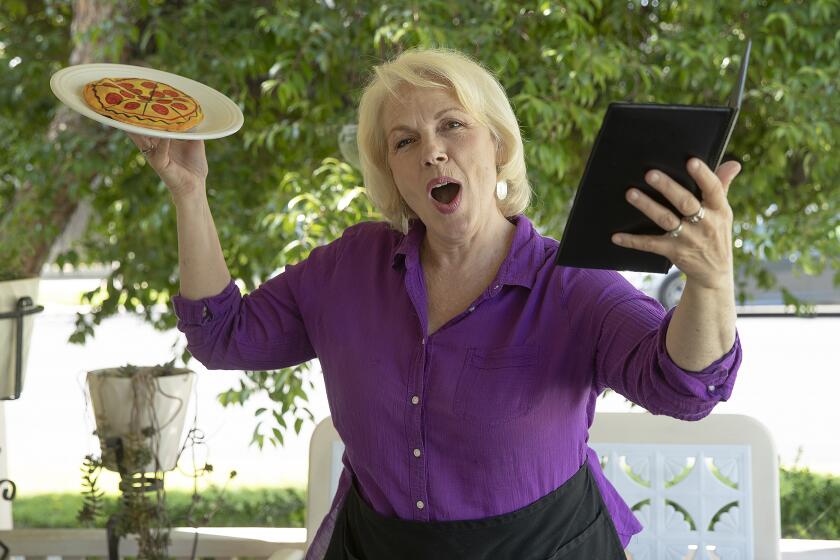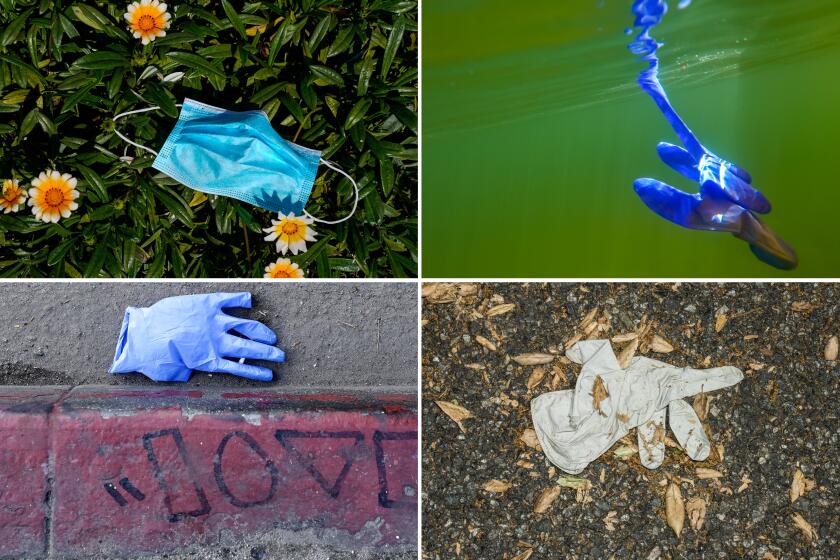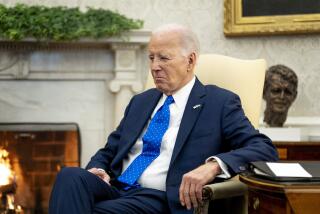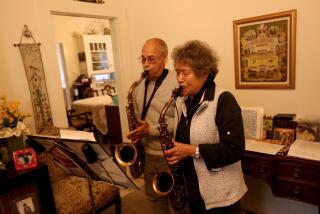Older does not equal expendable. We need to act in a way that protects our elders from coronavirus
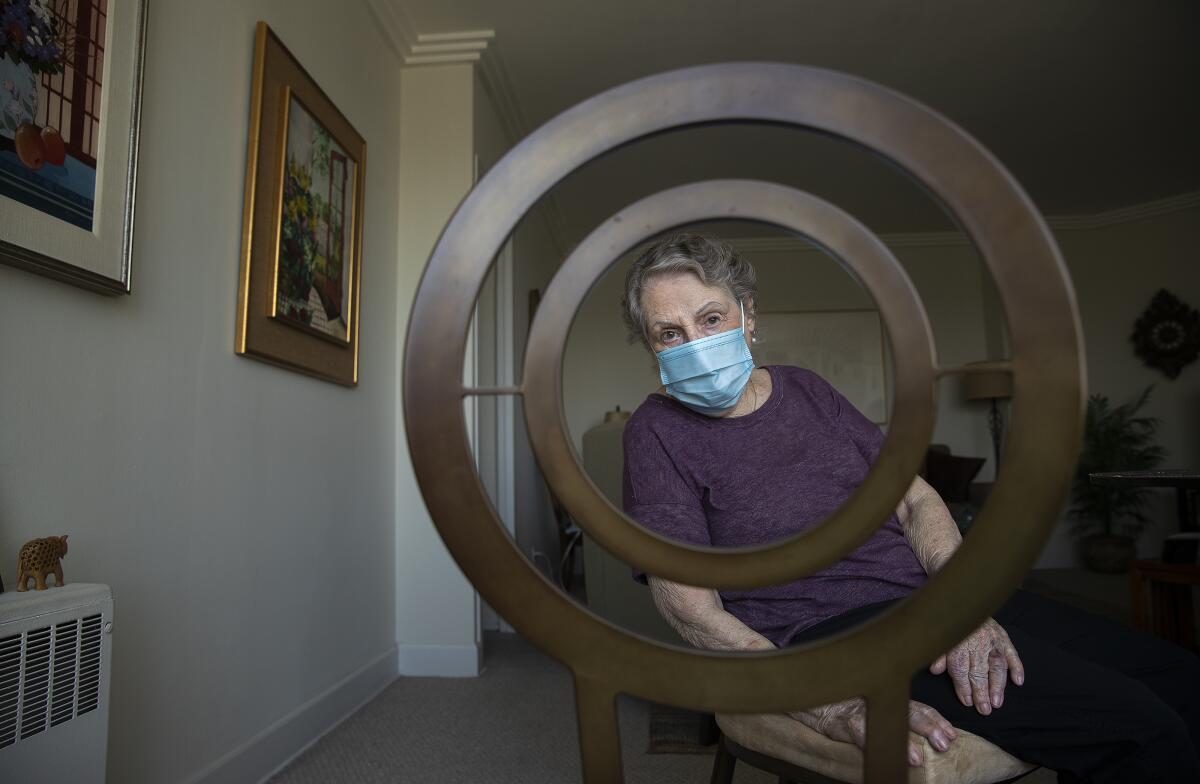
- Share via
I want to go to the movies. I want to go to the beach. I want to get my shaggy mane tamed by a professional. I want to enjoy a fine meal at a restaurant.
But I know I need to be patient about returning to the world at large, and not solely for my own safety. I need to be patient enough to ensure the safe return also of the vibrant, life-savoring older people I’ve been on the phone with all week.
Elaine Lubkin, who has been widowed for 10 years, gets lonely cooped up alone in her 11th-floor apartment at Park La Brea. She misses her classes, her club, her meals out with friends, the interesting speakers at her former temple’s wisdom circle, seeing her only grandchild in the flesh.
At 87, she’s experiencing this life pause with a particular poignancy that goes beyond her heightened coronavirus risk.
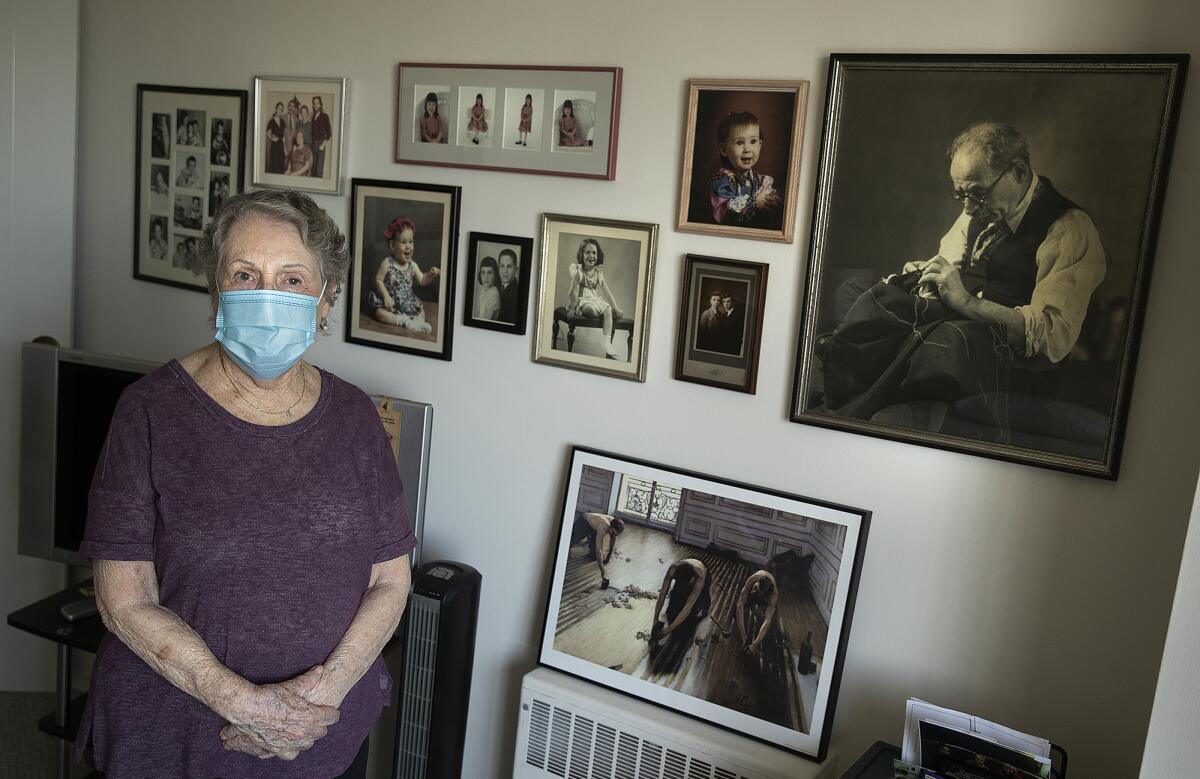
Being out and about brings her joy, she says. New learning experiences keep her sharp.
“I don’t have that many days left, and I can’t afford to spend them being isolated from the rest of the world,” she told me.
I’ve been angered a lot lately by the people who seem to see our society’s elders as expendable. By their indifference to the crises in our nursing homes. By their blithe cost-benefit analyses that imply that our older people might be acceptable sacrifices at the altar of economic revival. By their eagerness to crowd onto beaches for their own immediate pleasure, oblivious to the consequences sure to ripple out to those who, because of their age, are more vulnerable.
Vulnerable to the disease, that is, not in all ways. Life tends to makes you tougher over time, I think.
In the coronavirus shutdown, people turn to GoFundMe to ask strangers for the basics: money for food and rent to survive
Lubkin has survived two bouts of cancer and the loss of the husband she loved. She knows you get through things but that doing so takes work. She is trying to follow the rules and do the work right now. And for the sake of her and her friends, so will I.
Older people always have enriched my world. They’ve lived through things I haven’t. They’ve come to understand things I still don’t.
Understanding can take time, says Madonna Magee, 73, an actress and former longtime acting teacher who just recently — reminiscing alone in her North Hollywood apartment — grasped her own mother’s behavior whenever Magee and her four siblings got sick. Her mother would sterilize everything a sick child touched and keep that child separate, behind a closed door, warning the others not to touch even the doorknob.
Magee’s mother, she says, was 8 when the Spanish flu hit. She saw whole families wiped out.
“Now it’s hitting me. I just got the chills,” Magee told me. “We’re going through some of what she went through.”
Like Lubkin, Magee is widowed. She lost her beloved dog Bear one year, her husband Ken, to cancer, the next. They are “the ghosts of the place,” she told me. She still sometimes leaves the TV on in the living room when she goes to bed, imagining that Ken is out there, staying up late. She sometimes thinks she still hears Bear’s heavy breathing by her bed. It makes being alone inside a little more bearable, this feeling that they haven’t left her.
Like Lubkin, Magee’s very active. “I’m not used to just sitting,” she said.
She misses her yoga classes and biking. She misses her chiropractor and her grief group. She misses prepared food on the go — although the pandemic finally got her over the sad hump of avoiding cooking for one.
But after a recent bout of pneumonia, she stays inside to keep herself and others safe. She joins meditation and yoga and reiki sessions online. She sits on the balcony and imagines the whoosh of traffic as ocean waves, rolling in and out. She tries to face the moment bravely, at peace.
I think that a lot of people don’t clearly see their elders because they equate advanced age with frailty. I don’t.
Neither does John Sullivan, even though, just shy of 90, he has problems with his legs and now has to use a cane.
Before the pandemic, though, he wouldn’t miss Tuesday trivia night at Sherman Oaks’ Robin Hood British Pub, where his team, the High Tops, regularly ranked high.
The team includes someone in his 20s and others in their 30s and 40s, who ace the pop culture of now. Sullivan aces the pop culture of yore. Being multigenerational is the team’s secret weapon. I think it’s essential to a healthy society.
For now, Sullivan, who has been on his own since his lost his wife, Gerda, five years ago, looks forward to weekly trivia nights with his friends on Zoom. He wonders if he’ll ever again get to experience the joy of huddling closely with his teammates in a crowded pub. I’d like to do what I can to stem the tide of this virus, to help him get back there, even if it’s not quite the same.
Gloves people buy to protect themselves from coronavirus now are littering our streets. What does that say about us?
It’s easier for some older people to face this sudden retreat because they’re already comfortable with retreating.
“I was stepping back anyway. I’d already given up my car,” said Selma Kaufer, 85, whom I met writing a different column and checked back with this week. She told me she’s content to sit with a book or watch the world go by on the big balcony outside her apartment in Beverly Grove.
She’s lucky to have found someone to shop for her — and there’s room enough outside for her sons and her grandsons to visit while staying at least six feet away. She won’t let them closer.
Kaufer’s old enough to remember the polio epidemic, and visiting a close friend in an iron lung. She never forgot “the awful sound” of that machine. She’s taking this pandemic’s rules seriously.
So is Rodney Vaccaro, a 68-year-old screenwriter, who remembers being a small child when polio closed schools and public swimming pools. His brother got it and fully recovered, though many didn’t. He remembers the miraculous moment of standing in line to get the polio vaccine.
“I think it’s really important to try to listen to the voices that are trying to be reasonable right now,” Vaccaro told me.
He’s inclined to be reclusive anyway. He writes, paints, cooks and hangs out with his dog, Giuseppe.
“One of the gifts of age is that nothing seems all that important,” he said. “Things happen. OK, this is another thing.”
Back on the 11th floor at Park La Brea, when Lubkin gets restless, she sometimes sticks her head out the window and tries to take deep breaths.
Sometimes she drives to Santa Monica and sits in her daughter’s backyard to get to see her, if from a distance.
When she can, she goes outside for walks, although she’s wary of her building’s small elevator. She recently had to share it with a young man who wasn’t wearing a mask. She turned away from him and faced the wall.
She shouldn’t have had to. He should have automatically been doing his part to protect her.
I know I will because I have more days to spare.
More to Read
Sign up for Essential California
The most important California stories and recommendations in your inbox every morning.
You may occasionally receive promotional content from the Los Angeles Times.
